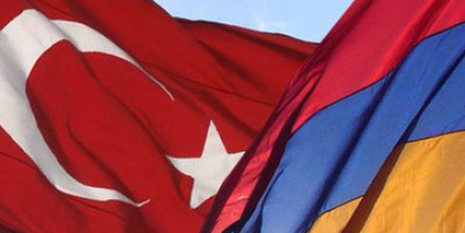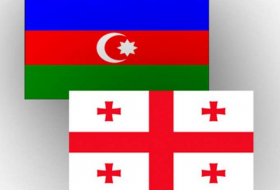During his visit to Switzerland on 10 October 2013, Turkey`s Foreign Ministry chief Ahmed Davutoglu spoke of the need to demonstrate "creative approach” to the matter. Namely, Davutoglu said: "We attach significance to normalization of Turkey-Armenia relations. However, for that to happen, problems in the South Caucasus, including the problem of Nagorno Karabakh have to be resolved. The resolution of the Karabakh problem comes with the end of the Armenian occupation” [i].
Commenting on former`s statement press-secretary of the Armenia`s MFA Tigran Balayan made the following remark: "Four years have passed since the signing of the protocols and for the last 4 years we keep hearing the same song from Turkey about "creative approach” [ii].
Addressing the issue during the Third European Armenian Convention held in the European Parliament on 15 October 2013, Armenia`s National Assembly President Ovik Abramyan said: "Despite bitter memories, Armenia made a move to normalize its relations with neighboring Turkey without any preconditions. While doing so, Armenia faced criticism of the diaspora and its general public… Armenia was eventually deprived of a chance to build a direct bridge to Europe; apparently, Azerbaijan`s pressure played its part” [iii].
Reintroduction of the signed protocols issue to the agenda, presumably, pursues the objective of mending Armenia`s ties with the West, in light of Yerevan`s decision to join the Customs Union. Some quarters, however, believe that this issue has become a traditional subject on the eve of the anniversary of the protocols` signing date. While evaluating Turkey-Armenia relations, it becomes obvious that issue of ratification of the protocols is yet to become the subject of talks between the two countries.
Reactions to the Turkey-Armenia relations, especially re-initiated speculations on the protocols, in Turkish and Azerbaijani media, paints rather mixed picture. The "horse`s view” (in a horse drawn carriage blinders are used, to make sure the animal looks ahead instead of looking around) to the problem is unlikely to lead us to accurate conclusions.
The geopolitical situation that has started to emerge as of the early 1990s lately has undergone a dramatic change. We believe Russia`s military hostility against Georgia with ensuing recognition of independence Abkhazia and South Ossetia and implication of non-regional powers, Turkey`s efforts to reinvigorate frozen Turkey-Armenia relations through "football diplomacy”, and Armenia`s consent to join Russia-lead Customs and Eurasian Unions had seriously upset region`s political balance.
Subject of ongoing speculations is whether Azerbaijan`s occupied territories are taken into consideration in Turkey-Armenia protocols. Turkish and Armenian officials issue conflicting statements. Armenia`s leadership insists that Nagorno Karabakh problem is not viewed in the context of establishing of relations between the two countries. In the meantime, Turkish officials are specifically emphasizing the inconceivability of bolstering ties and opening of borders without a resolution to this problem.
Turkey`s rapprochement towards Armenia at the time was not welcomed by Azerbaijan. Resentment and reproach were conveyed at the highest levels of leadership, and it was not until the President and the Prime Minister of Turkey particularly acknowledged Azerbaijan`s interests that the tension was alleviated.
Extensive analysis of the process reveals the following:
Fundamental changes in the foreign policy of Turkey expose vested interests of this country in the region (to evade the U.S. and EU pressure);
U.S. and EU pressure Turkey on the issues of opening borders and establishing diplomatic relations with Armenia;
AKP (Justice and Development Party) government has views of its own on the issue while Foreign Minister Davutoglu`s policy of "zero problems with neighbors” clearly failed. Political debate over PKK demands, dubbed "democratic opening”, that threatens the very unity, equality and national security concept of the nation is an assertion to underpin the claim.
Nagorno Karabakh phrase is missing from the text of the protocols signed between Turkey and Armenia. Chairman of the Foreign Relations Committee of the Grand National Assembly of Turkey Hasan Murat put it this way: "Both protocols contain no chapters referring to Azerbaijan-Turkey or Azerbaijan-Armenia relations. We ultimately wish that relations between Azerbaijan and Armenia reach the certain point and particularly, that the issues of Nagorno Karabakh and occupied Azerbaijani territories get resolved”.
Genuine motive becomes evident; Azerbaijan and Armenia must solve the problem themselves. Nagorno Karabakh problem is not on the bilateral agenda anyway. Should Azerbaijan manage to resolve the issue, Turkey could sell this victory as one of its own to the domestic audience.
Main issue is the ratification of these protocols in the parliaments of both countries. Upon the signing of the protocols, Turkey`s Foreign Minister initiated talks with political parties, seeking to secure their approval. The MHP (Nationalist Movement Party) had opposed the talks while other political parties have expressed an unequivocal position that protocols would be rejected were they to be brought to the Parliament floor by the AKP. Albeit a challenge, the AKP is yet to exhaust the chances of ratification of the protocols in the Parliament. In the event of a deep divide within the party, however, confirmation of the protocols may run aground. Government had discussed the protocols with the political parties represented in the Turkey`s Grand National Assembly, but the chances of protocols being resubmitted to the Assembly are bleak.
President of Armenia also held separate talks with the political parties and mass media representatives, aimed at ratification of the protocols in the Parliament. It had proved to be a fruitless effort. Opposition parties, led by "Dashnaktsusyun”, are fiercely confronting the issue and insist that protocols fail to uphold Armenia`s national interests. "Dashnaktsusyun” now demands resignation of not only the Foreign Minister Nalbandyan but also that of the President Sargsyan. Despite ruling party`s majority in the Parliament, Sargsyan is likely to face fierce opposition, should he attempt to introduce them to the Parliament.
Although according to Ovik Abramyan, "…Armenia was eventually deprived of a chance to build a direct bridge to Europe”, Armenia has certainly done nothing to normalize its relations with Turkey by refusing to abandon its "genocide” propaganda and failing to display a constructive posture towards resolution of the Nagorno Karabakh problem. On the contrary, Armenia is stepping up its international propaganda around the world in the run-up to the 100th anniversary of the so called "genocide”. Moreover, Armenian diaspora organizations are continuing to actively pursue the anti-Turkey agenda.
Although Azerbaijan has refrained from public statements on the latest developments, there is a sense of remaining concern within the public opinion. Turkey, nevertheless, is well aware, that without resolution of the Nagorno Karabakh problem, the country cannot open borders with Armenia – a step otherwise to cast a shadow upon fraternal relations.
Dr. Hatem Jabbarli
More about:
















































